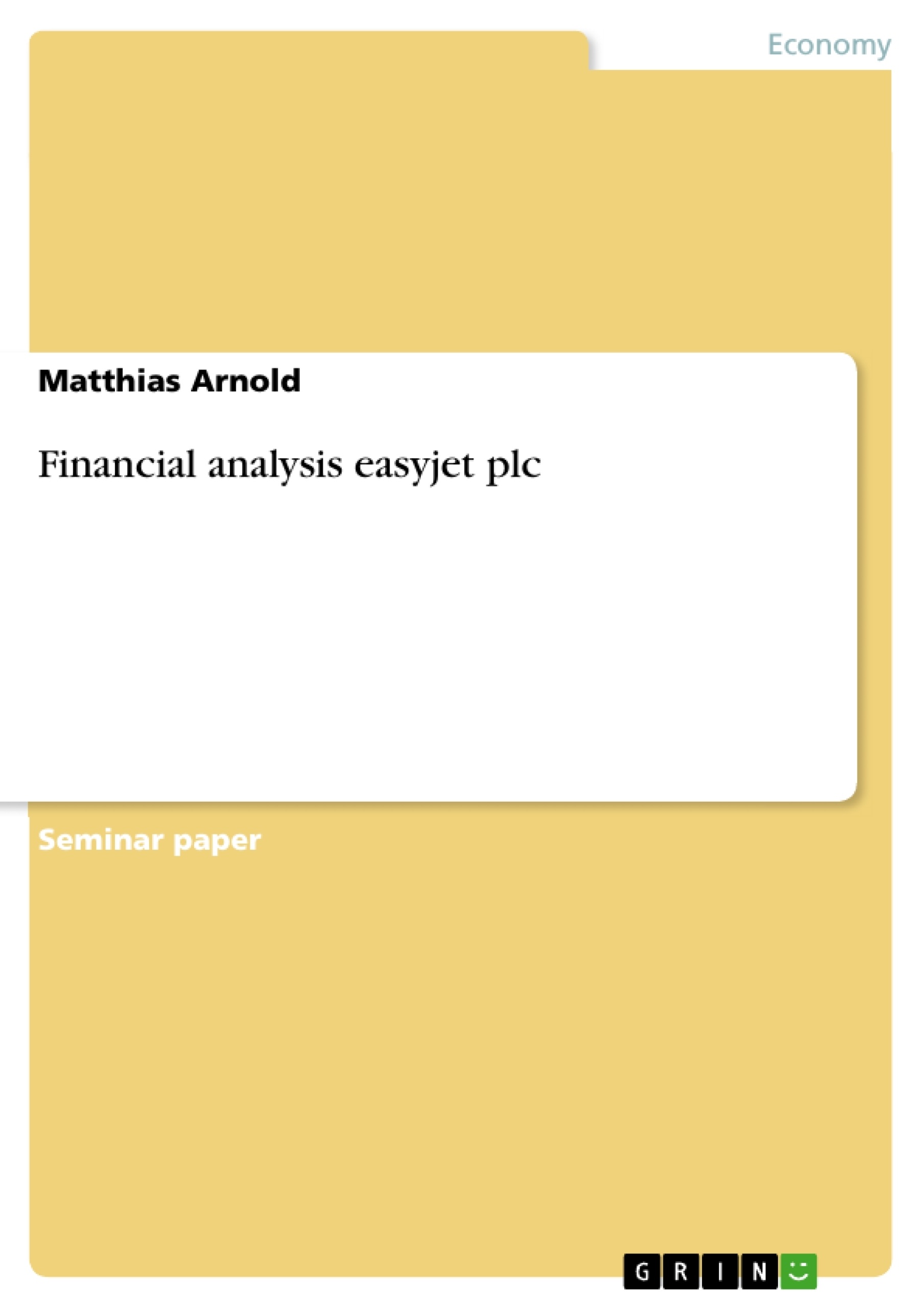Excerpt
Table of contents
Summary
Introduction
Accounting policies
Financial position
Market perception
Conclusion
Appendix
References
Summary
Easyjet is an European low-cost airline with a turnover of over ₤bn 1 in financial year 2004.
Performance in terms of ROCE is with 6% lower than that of major competitor Ryanair but higher than the sector median. While figures dropped over the last 3 years, figures now rose again.
Efficiency in terms of asset utilisation is with 1 substantially higher than those of major competitors.
Profitability in general is slightly lower than the industry median and has been compromised for growth during the last years.
Liquidity and risk management is very good.
Very low gearing and moderate performance lead to low return on equity.
Market perception is very high with an P/E ratio of 34.
Easyjet’s accounting policies in general comply with legal as well as industry standards.
Introduction
This assignment aims at preparing an analytical review of the financial position and reporting of Easyjet plc from an investor’s viewpoint. Therefore an extensive analysis of the company’s financial strengths and weaknesses is carried out. Furthermore, the corporation’s accounting policies are analysed taking into account general practice as well as industry standards. Moreover, Easyjet’s perception by the financial markets is weighted against the company’s financial position.
Easyjet plc is the holding company of a low-cost passenger airline operating from 14 bases throughout Europe. Whereas also branded as part of Stelios Haji-Ioannou’s EasyGroup, there are no financial bounds between Easyjet and other Easy-companies. Easyjet plc is traded on the London Stock Exchange (LSE) and accounted for revenues of ₤bn 1,091 in the financial year 2004. Main competitors are other low-cost carriers including Ryanair, but also major scheduled airline operators as British Airways or British Midland (Datamonitor 2005). For peer group purposes in the financial analysis, the Irish-based low-cost carrier Ryanair as well as UK-based bmi and BA shall be used.
Accounting policies
Accounting policies are the company’s own set of values regarding its financial reporting procedures. Basing on general accounting conventions as historic cost, prudence and objectivity convention, these policies have to comply with national accounting standards as the UK GAAP. Moreover, if listed on the LSE, the policies must meet further regulations imposed by the FSA. Furthermore, from 2005 onwards, all companies in the EU are bound to adopt the International Financial Reporting Standard which harmonises national accounting legislation (Atrill and McLaney 2004).
Easyjet plc created its consolidated accounts using historical cost convention and applying UK GAAP. As requested by the FSA, Easyjet geographically divides its turnover into UK and non-UK. Furthermore, Easyjet takes measures to ensure that from financial year starting October 2005, IFRS is implemented. Critical entries within the accounting policies are among others value and depreciation of aircrafts and maintenance costs. Aircraft value is depreciated over 7 years to a residual value between ₤ 12 and 20 million regarding to aircraft type. This bases on historical knowledge and takes into account a useful lifetime of 20-30 years for each aircraft, whereas Ryanair explicitly estimates 20 years for the respective aircraft type (Ryanair 2005). The high variance between residual value of Boeing 737 and Airbus 319, while being comparable aircrafts, led to a further mark down of value that has not been considered earlier. Also maintenance costs, mandatory for leased aircrafts, are estimated to the management’s best knowledge but could vary highly. Eventually yearly impairment tests for important fixed assets could lead to a better valuation and a better view of the financial situation (Easyjet 2004).
Easyjet’s accounting policies in general meet GAAP as well as industry standards. Despite some minor critical entries, it can therefore be concluded in unison with auditor KPMG that Easyjet’s “accounts have been properly prepared” and “give a true and fair view of the state of affairs” (Easyjet 2004, p.53).
[...]
- Quote paper
- Matthias Arnold (Author), 2005, Financial analysis easyjet plc, Munich, GRIN Verlag, https://www.grin.com/document/55702
Publish now - it's free






















Comments